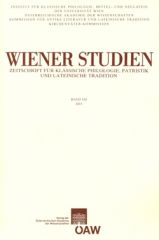
Wiener Studien 124/2011, pp. 55-93, 2011/11/07
Zeitschrift für Klassische Philologie, Patristik und lateinische Tradition

The factors of ‘place/space’ and ‘philosophical instruction’ both shape the specific points of Epictetus’ gender discourse. The place/space gives rise to a hierarchic situation of teaching exclusively young boys of the upper class, but no women, it creates a distance from home that is a test for the boys’ developing manlihood, and it relocates the philosophical ideal of masculinity in two literary quotations from the Iliad and Plato’s Phaedo. Philosophical instruction, however, is more important in shaping Epictetus’ gender discourse. Emotional behaviour is stigmatized as effeminate, which is an efficious rhetoric device to convince the young boys in the audience, but does not imply or go along with essentialistic discrimination concerning women’s rational abilities. This pragmatic use of gender stereotypes is due to the strong insistence on conviction which Epictetus shows in comparison with his teacher Musonius Rufus and corresponds to Epictetus’ caustic style of teaching which follows the Cynics’ example.